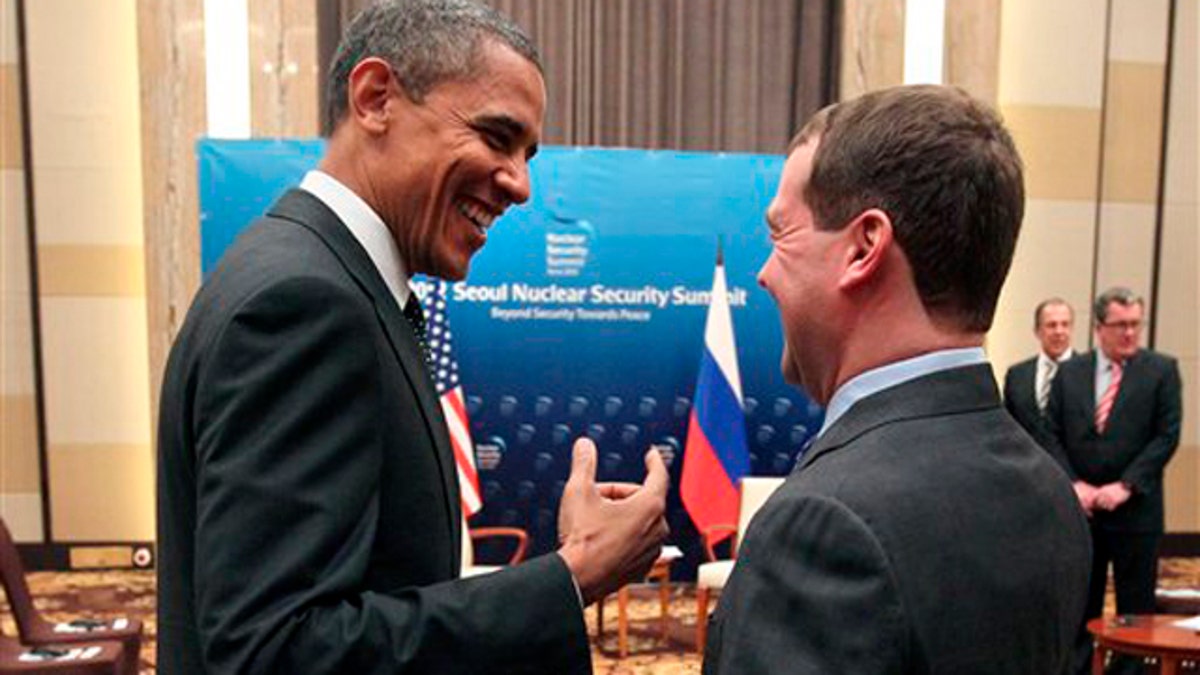
President Obama and Russian President Dmitry Medvedev talk following the conclusion of their bilateral meeting at the Nuclear Security Summit in Seoul, South Korea. (AP)
President Obama just gave the world a glimpse into his future foreign policy plans this week, should he win a second term. On tap for Obama II: more faith in our adversaries, more betrayal of our traditional allies and more unilateral indulgence in nuclear abolition fantasies.
Monday, President Obama told Russian President Medvedev that “This is my last election. After my election, I have more flexibility.” Medvedev responded that he would dutifully report that tidbit to Vladimir Putin back in the Kremlin. The men apparently did not realize their discussion was being caught by a live microphone.
Given that the two were talking about missile defense, the implication was clear enough. In order to please Russia, President Obama will use a second term to weaken further the peaceful, purely defensive systems that can defend the U.S. and our allies from missile attacks.
Mr. Obama did not refute this conclusion. Instead, he lashed out at others for the inadvertent clarity, complaining to the press about "the stories you guys have been writing over the last 24 hours."
This fits what is now a clear fact pattern.
In September of his first year in office, Mr. Obama betrayed Poland and the Czech Republic, our allies on missile defense.
They had previously agreed to host missile interceptors and radars necessary to defend against inbound missiles from Southwest Asian countries like Iran. In so doing, they had stuck their necks out—gaining the ire of their traditional adversary and former occupier Russia—to show their commitment to NATO, their American allies, and a civilized order that rejects being held hostage by a future Iranian nuclear arsenal.
Mr. Obama canceled the deployment. In return, he and his Secretary of State received a number of feel-good photo opportunities with Russian leaders but little else.
Russian help on Afghanistan never materialized—substantially none of the military goods our troops need to fight in Afghanistan have ever even transshipped through Russia.
On the Arab Spring, to the extent Mr. Obama has ever had a policy, Moscow has opposed it.
In late 2010, President Obama got the Senate to ratify the new START treaty. The agreement drastically cut America’s nuclear arsenal in exchange for reductions Moscow was already undertaking. It ignored Russia’s advantage in tactical nuclear weapons. Worst of all, the Russians believe that the treaty pledged the U.S. to forgo missile defense enhancements—a belief Mr. Obama and his administration have quietly indulged.
In other words, Russia wants to U.S. and our allies to remain as defenseless as possible to ballistic missile attacks from existing or future nuclear powers. President Obama helped Moscow achieve this in return for nothing other than a supposedly improved relationship. And he will ‘double down’ on this far-left approach to foreign policy in the second term he expects, when, as his comments imply, he no longer feels accountable to the American electorate.
Mr. Obama will clearly continue to indulge his fantasy that nuclear weapons can be wished out of existence—cheered on in his delusions by the weak Washington foreign policy establishment, Moscow, and nuclear aspirants around the world.
The alternative to this is to tell the truth about the gathering nuclear threats America faces.
- Pakistan—which harbored Usama bin Laden and uses terrorists as instruments of foreign policy—joined the nuclear club in 1998.
- North Korea—which has proliferated most of the weapons systems it has possessed throughout its history—conducted nuclear tests in 2006 and 2009.
- Iran—which has seen itself fighting a low-grade war against America since it came to power and took our diplomats hostage in 1979—is known to everyone outside of Mr. Obama’s politicized intelligence bureaucracy to be working assiduously on a nuclear weapons capability.
A realistic response to this is that the U.S. needs better capabilities for missile defense, preemptive counter-proliferation and a modern and credible nuclear deterrent.
But the U.S. hasn’t tested any of its nuclear arsenal since 1992. Mr. Obama has cut missile defense. He canceled effective systems like the Airborne Laser, which could have stopped an Iranian or North Korean nuclear missile in its vulnerable boost phase. And President Obama is clearly committed to more unilateral U.S. disarmament and meekness in hopes our adversaries will respond in kind—despite all evidence to the contrary.
Christian Whiton is a former U.S. State Department senior adviser and is a principal at DC International Advisory.








































